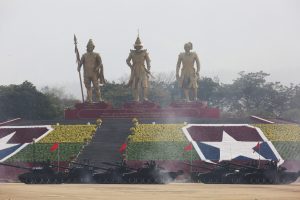Myanmar’s top military leader has vowed once again to put down the resistance to his rule, as he presided over a showy military parade in the capital Naypyidaw to mark the annual Armed Forces Day.
Casting his voice over the serried ranks of soldiers on a large parade ground, Senior Gen. Min Aung Hlaing described the resistance to his military administration as a terrorist movement bent on breaking the country apart and said that the military needs to take decisive action to defeat it.
He particularly singled out the opposition National Unity Government (NUG) and the People’s Defense Forces (PDFs) with which it is loosely aligned, which are waging an intensifying armed struggle to overturn the coup and extirpate the military from the country’s political life.
“The terror acts of NUG and its lackey so-called PDFs are needed to be tackled for good and all,” Min Aung Hlaing said, according to a transcript of the speech published in the Global New Light of Myanmar. “Tatmadaw and government also need to take an action against this terrorist group trying to devastate the country and kill the people.” (“Tatmadaw” is an honorific for the Myanmar armed forces.)
As he spoke, the Associated Press reported, “members of all service branches marched in mass formations onto a huge parade ground in the capital, Naypyitaw, backed by armored vehicles, missiles and artillery as well as fighter jets and helicopters flying overhead.”
Since the coup, the military junta has struggled to put down the growing resistance to its rule, which has faced the armed forces with their greatest challenge since independence in 1948. Over the past two years, armed resistance has spread to central regions of the country that have seen relatively little conflict compared to outlying ethnic minority-inhabited regions of the country.
In a report last month, the United Nations said that the military coup had created “a perpetual human rights crisis through the continuous use of violence, including the killing, arbitrary arrest, torture and enforced disappearance of anti-coup opponents.” It found that 255 of Myanmar’s 330 townships, or nearly four in five, had been impacted by armed clashes between the military and those resisting its rule.
The bulk of Min Aung Hlaing’s speech was an exposition of the Myanmar military’s self-justifying mythos, based in its role in the struggle against Japanese occupation during World War II – Armed Forces Day marks the start of a 1945 uprising against the Japanese – and its efforts to crush a range of foes that threatened the union, from Chinese nationalist armies to ethnic rebel groups.
All this functioned as a prelude to justifications for the military’s seizure of power in February 2021, which it justified by bogus claims of electoral fraud, and the fierce crackdowns that it has prosecuted in its defense ever since. He said that the military will take action against the NUG and other “terrorist organizations” and armed resistance groups, adding “martial law is increasingly being imposed in important townships that need to be controlled during the second phase of the State of Emergency.”
Min Aung Hlaing said the Tatmadaw will “put in effort into achieving full law enforcement and tranquility across the Union to ensure the socio-economic security of all citizens.” He also defended the junta’s decision to hold an “election” later this year, with the aim of building a “Union based on a democracy and federal system along with the practice of a genuine and disciplined multiparty democracy system in justice and prudence.”
Min Aung Hlaing’s speech offers an insight into the solipsistic worldview of the Myanmar military’s top brass, who are steeped in self-serving myths about their own indispensability. It also demonstrates the extent to which these self-reinforcing myths are insulated from any critical view point. As Andrew Selth wrote in a paper in September 2021, enlistees in the Myanmar armed forces are subject to a process of patriotic and ideological indoctrination that aims “to create a narrow and self-serving view of the armed forces and its place in Myanmar’s history and society.”
All this gives a strong indication that even as its hold over the country weakens, the military is very far from ceding power willingly.













